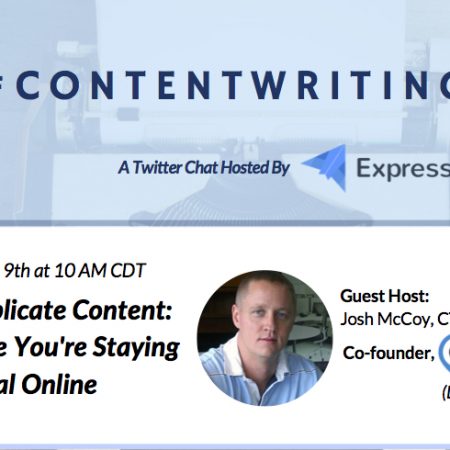#ContentWritingChat Recap: Avoiding Duplicate Content- How to Ensure You’re Staying Original Online with Joshua McCoy
Did you miss #ContentWritingChat this week? If you did, you missed a pretty special chat! However, there’s no need to worry because we have you covered with a recap of Tuesday’s chat. Let’s dive in! #ContentWritingChat Recap: Avoiding Duplicate Content- How to Ensure You’re Staying Original Online with Joshua McCoy Join #ContentWritingChat on Aug 9th 10 AM CDT with our own @JoshuaMMcCoy! AND: special announcement about @copyfind! pic.twitter.com/LSHnGwRDAV — Express Writers (@ExpWriters) August 2, 2016 The reason this week’s chat was extra special is because we were actually joined by our very own, Josh McCoy. Josh is the CTO here at Express Writers and he’s the founder of soon-to-be-launched Copyfind, a new tool he’s building that will offer the deepest duplicate content search on the web! Our own Julia McCoy is the co-founder. Sign up to get on the waiting list here. Q1: What is “duplicate content”? Define. Do you know what “duplicate content” means on the web? Here’s what some participants in Tuesday’s chat had to say: A1 Online content that matches substantive bits of other content, within domains or platforms. #ContentWritingChat — Josh McCoy (@JoshuaMMcCoy) August 9, 2016 Josh said duplicate content is defined by online content that matches substantive bits of other content online. A1 @Google said it best in their duplicate content help piece: https://t.co/TNZKQ9wxvI #ContentWritingChat pic.twitter.com/Tai15dvhAl — Copyfind™ (@copyfind) August 9, 2016 If you were wondering what Google has to say about duplicate content, there definition is in the tweet above. Thanks to Julia (our CEO who was behind the @Copyfind account) for sharing this! A1: Dupe content = same/very similar copy living on multiple URLs. #ContentWritingChat https://t.co/yarZVlOdQy — ThinkSEM (@ThinkSEM) August 9, 2016 As Sarah said, duplicate content is the same or very similar content that’s on multiple URLs. A1 Copy paste type content #ContentWritingChat https://t.co/p5uRBOwXnn — Varun Kumar (@varunkr842) August 9, 2016 Content that is copied from one source and pasted onto another is considered duplicate content. Q1(A): Duplicate content can be word-for-word or it can be very similar in wording and structure. #ContentWritingChat — Katria Petroff (@KatPetroff99) August 9, 2016 Katria knows duplicate content doesn’t have to be word-for-word. If it’s very similar in wording or structure, Google may still pick it up as being duplicated. Q2: How important is it for you to make sure you’re publishing only original content? Check out what some participants said about the importance of publishing original content: A2 It’s a no-no to copy content and post as yours – even if unintended. Always search & make sure you’re 100% original #ContentWritingChat — Josh McCoy (@JoshuaMMcCoy) August 9, 2016 As Josh said, it’s important to make sure you’re always being 100% original. Copying content from someone else isn’t cool! It’s worth it to search and make sure you aren’t stealing from someone else. A2a Huge. You’ll lose rankings & respect if you’re caught duplicating. Even if it’s accidental. #ContentWritingChat pic.twitter.com/ivmz30NZ2h — Copyfind™ (@copyfind) August 9, 2016 A2b “Scraping” content, ie copying from someone else’s site, is heavily penalized by Google & is copyright infringement. #ContentWritingChat — Copyfind™ (@copyfind) August 9, 2016 Even if it’s accidental, you face consequences for duplicating someone else’s content. You risk being penalized by Google and could even face copyright infringement for serious offences. Those are two things you don’t want to deal with. A2: I think original content is extremely important if you are trying to establish and build your reputation #ContentWritingChat — Jane Clauss (@JaneClauss) August 9, 2016 Jane believes original content is important if you’re trying to establish and build your reputation online. This is key! A2: It’s key that you’re providing your audience with quality, unique content. It establishes trust with your audience. #contentwritingchat — Netvantage Marketing (@netvantage) August 9, 2016 Providing your audience with original content is a great way to establish trust. A2: Not just important but crucial, dare I say VITAL! #ContentWritingChat — Zachary Fenell (@zacharyfenell) August 9, 2016 We like the way Zachary thinks! Creating original content is VITAL! Vital! Original content speaks to your voice/authenticity/knowledge and authority on the topic. #ContentWritingChat https://t.co/bVRylb36xO — Stephanie BwaBwa (@storycreative_) August 9, 2016 It looks like Stephanie agrees about original content being vital. She said it speaks to your voice, authenticity, knowledge, and authority on a topic. A2. Utmost importance! Not only are you protecting your brand, but you’re also growing credibility. #ContentWritingChat @ExpWriters — Rachel Jolley (@iamracheljolley) August 9, 2016 We agree, Rachel! A2. Your content is your identity. Do you want someone else’s? #contentwritingchat https://t.co/uBuk5kryi9 — Rohan Ayyar (@searchrook) August 9, 2016 This is a great way to look at it! It’s even more of a reason to focus on producing original content online. A2: There’s nothing wrong with publishing unoriginal content topics, but you have to make them unique in your own way! #contentwritingchat — MioDatos (@MioDatos) August 9, 2016 Even if you aren’t writing about the most original topic idea, you still want to find a way to put your unique spin on it. Q3: Does syndication ever cross the line of duplication? There are a lot of sources online that syndicate content. Does it ever cross the line or become too much? Here’s what we found out in the chat: A3 News is good syndication. Example: PRWeb releases. Syndicated blog feeds: be careful. 100% originality should be #1. #ContentWritingChat — Josh McCoy (@JoshuaMMcCoy) August 9, 2016 As Josh said, news is good when it comes to syndication. News articles are often syndicated and picked up by multiple websites. However, he recommends being careful with syndicated blog feeds. A3 If it’s news, syndication is fine. If it’s not news, be careful not to overdo. Originality is best on your key sites. #ContentWritingChat — Copyfind™ (@copyfind) August 9, 2016 Julia agrees! You have to be careful if you’re not dealing with news stories. A3: Credit the source and add an introduction to avoid completely copying/duplicating! #ContentWritingChat — Hannah Chapple (@HannahChapple) August 9, 2016 Hannah’s advice is to make sure you always credit the source. … Read more


